ഇരയിമ്മൻ തമ്പി ജന്മദിനം(29 .07.2013 )
Among excellent works of Thampi are ‘Amba Gauri’ (Aarabhi Varnam), ‘Karuna Cheyvan enthu thaamasam’ (Sri), ‘Paradhevathei’ (Thodi), ‘Kamalathikalam’ (Kambhoji) ‘Pahimaam Girithanaye’ (Saveri), ‘Adimalarina Thanne’ (Mukhari), ‘Neelavarna Pahimam’ (Suruthi), ‘Ehi Baalagopala Krishna’ (Punnagavarali Ragam), and ‘Sambho Gaureesha’ (Kedaaragaula.). He has composed songs on Sree Padmanabha of Thiruvananthapuram, Sree Krishna of Guruvayoor and also Chettumala Devi of Chettumala temple attached to Puthu mana veedu in Karamana in Thiruvananthapuram city. Some of his padas refer to Swathi , his aunt and his sister.
In 1856 Irayamman Thampi died after enjoying the patronage of four Travancore kingsand two queens. Swathi is known to have referred to Thampi as Thampi maman (uncle thampi). Irayimman Thampi had the occasion to write a lullaby for Swathi Thirunal and ironically also wrote a charama sloka for Swathi in 1848.
IRAYIMMAN
THAMPI AN ARTISTIC GENIUS
Iravivarman
Thampi was the son of Parukkutti Thankachi, daughter of Makairam
Thirunal Ravivarma. His father was Kerala Varma Thampuran. Iravivarma
was born in 1782 and was popularly known as Irayimman Thampi. Even
during his childhood he was scholar in drama, grammer, logic , kaavya
and alankara and was eminent in music and literature. However, his
greatness in classical music reached its zenith during the reign
of Swathi Thirunal. He was one among the eminent men who adorned
Swathi Thirunal’s court. Their mutual encouragement had helped
them in polishing their potentials .
There existed
a healthy competition between them in composing songs in which Thampi
was always the winner. Swathi Thirunal’s famous lyrics ‘Panchabanan
thannudei.....’ and Thampi’s “Prananadhanenikku Nalkiya.....”
were the results of such competitions. This particular work of Thampi
is the most beautiful sringarapadam in Malayalam.Thampi
has composed 21 Sankeerthanas, five Malayalam Keerthanas, five Varnas,
and 22 Padams and one lullaby. He has also created musical works in Sanskrit
and Manipravalam. Though he excelled in Bhakthi and Sringara he has proved
his eminence in all Bhavas through his various works. He has composed
beautiful varnas in Aarabhi, Sankaraabharanam, Neelambari, Bhairavi and
Punnagavaraali ragas. Sanskrit Keerthanas in rare ragas, like Irdisha,
Manchi and Kakubha deserve special mentions. Irayamman Thampi was also
enjoyed an esteemed position among the Kathakali musicians of Kerala.
His works include single verses, Keerthanas, Malayala Padams, Varnas,
Murajapappana, Subhadraharanam, Thiruvathirappattu, Navarathri Prabhandham,
Attakkadhas like Utharaswayamvaram, Keechakavadham, Dakshayaagam, and
Kilipattu like Rasakreeda and Vasishtam. ‘Omanathinkal Kidavo’
the lullaby composed by Thampi is a lyric hummed by mothers all over Kerala
for generations.Among excellent works of Thampi are ‘Amba Gauri’ (Aarabhi Varnam), ‘Karuna Cheyvan enthu thaamasam’ (Sri), ‘Paradhevathei’ (Thodi), ‘Kamalathikalam’ (Kambhoji) ‘Pahimaam Girithanaye’ (Saveri), ‘Adimalarina Thanne’ (Mukhari), ‘Neelavarna Pahimam’ (Suruthi), ‘Ehi Baalagopala Krishna’ (Punnagavarali Ragam), and ‘Sambho Gaureesha’ (Kedaaragaula.). He has composed songs on Sree Padmanabha of Thiruvananthapuram, Sree Krishna of Guruvayoor and also Chettumala Devi of Chettumala temple attached to Puthu mana veedu in Karamana in Thiruvananthapuram city. Some of his padas refer to Swathi , his aunt and his sister.
In 1856 Irayamman Thampi died after enjoying the patronage of four Travancore kingsand two queens. Swathi is known to have referred to Thampi as Thampi maman (uncle thampi). Irayimman Thampi had the occasion to write a lullaby for Swathi Thirunal and ironically also wrote a charama sloka for Swathi in 1848.
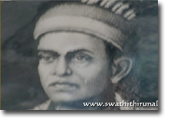 |
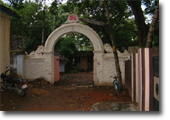 |
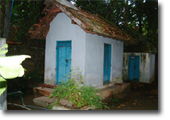 |
| Irayimman Thampi | Puthumana Ammaveedu | Memorial for Thampi in Puthumana |
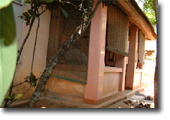 |
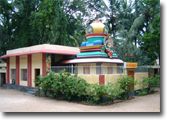 |
|
| A House in Kizhakkemadam | ChuttumalaDevitemple |

No comments:
Post a Comment